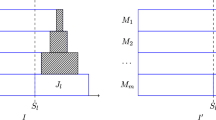Abstract
We consider a scheduling problem with m identical machines in parallel and the minimum makespan objective. The Longest Processing Time first (LPT) rule is a well-known approximation algorithm for this problem. Although its worst-case approximation ratio has been determined theoretically, it is known that the worst-case approximation ratio of LPT can be smaller with instances of smaller processing times. We assume that each job’s processing time is not longer than 1/k times the optimal makespan for a given integer k. We derive the worst-case approximation ratio of the LPT algorithm in terms of parameters k and m. For that purpose, we divide the whole set of instances of the original problem into classes defined by different values of parameters k and m. On each of those classes, we derive an exact upper bound on the worst-case performance ratio as a function of parameters k and m. We also show that there exist classes of instances for which our worst-case approximation ratio is better than previous bounds. Our bound can complement previous research in terms of the performance analysis of LPT.











Similar content being viewed by others
References
Alon, N., Azar, Y., Woeginger, G. J., & Yadid, T. (1998). Approximation schemes for scheduling on parallel machines. Journal of Scheduling, 1(1), 55–66.
Blocher, J. D., & Sevastyanov, S. (2015). A note on the Coffman-Sethi bound for LPT scheduling. Journal of Scheduling, 18(3), 325–327.
Chen, B. (1993). A note on LPT scheduling. Operations Research Letters, 14(3), 139–142.
Coffman, E. G., & Sethi, R. (1976). A generalized bound on LPT sequencing. In: Proceedings of the 1976 ACM SIGMETRICS conference on Computer performance modeling measurement and evaluation (pp. 306–310).
Coffman, E. G., Jr., Garey, M. R., & Johnson, D. S. (1978). An application of bin-packing to multiprocessor scheduling. SIAM Journal on Computing, 7(1), 1–17.
Della Croce, F., & Scatamacchia, R. (2020). The longest processing time rule for identical parallel machines revisited. Journal of Scheduling, 23(2), 163–176.
Della Croce, F., Scatamacchia, R., & T’kindt, V. (2019). A tight linear time \(\frac{13}{12}\)-approximation algorithm for the \(P2||C_{\max }\) problem. Journal of Combinatorial Optimization, 38(2), 608–617.
Eck, B. T., & Pinedo, M. (1993). On the minimization of the makespan subject to flowtime optimality. Operations Research, 41(4), 797–801.
Frenk, J., & Rinnooy Kan, A. (1987). The asymptotic optimality of the LPT rule. Mathematics of Operations Research, 12(2), 241–254.
Garey, M. R., & Johnson, D. S. (1978). “Strong’’ NP-completeness results: motivation, examples, and implications. Journal of the ACM, 25(3), 499–508.
Graham, R. L. (1969). Bounds on multiprocessing timing anomalies. SIAM Journal on Applied Mathematics, 17(2), 416–429.
Graham, R. L., Lawler, E. L., Lenstra, J. K., & Kan, A. R. (1979). Optimization and approximation in deterministic sequencing and scheduling: a survey. In Annals of Discrete Mathematics (Vol. 5, pp. 287–326). Elsevier.
Gupta, J. N., & Ruiz-Torres, A. J. (2001). A LISTFIT heuristic for minimizing makespan on identical parallel machines. Production Planning & Control, 12(1), 28–36.
Ibarra, O. H., & Kim, C. E. (1977). Heuristic algorithms for scheduling independent tasks on nonidentical processors. Journal of the ACM (JACM), 24(2), 280–289.
Jansen, K. (2010). An EPTAS for scheduling jobs on uniform processors: using an MILP relaxation with a constant number of integral variables. SIAM Journal on Discrete Mathematics, 24(2), 457–485.
Jansen, K., Klein, K. M., & Verschae, J. (2017). Improved efficient approximation schemes for scheduling jobs on identical and uniform machines. In: Proceedings of the 13th workshop on models and algorithms for planning and scheduling problems (MAPSP 2017) (pp. 77–79).
Lee, C. Y., & Massey, J. D. (1988). Multiprocessor scheduling: combining LPT and MULTIFIT. Discrete Applied Mathematics, 20(3), 233–242.
Williamson, D. P., & Shmoys, D. B. (2011). The Design of Approximation Algorithms (1st ed.). Cambridge: Cambridge University Press.
Acknowledgements
The authors would like to thank anonymous referees who provided very constructive and detailed comments on a previous version of the manuscript.
Author information
Authors and Affiliations
Corresponding author
Additional information
Publisher's Note
Springer Nature remains neutral with regard to jurisdictional claims in published maps and institutional affiliations.
Rights and permissions
About this article
Cite this article
Lee, M., Lee, K. & Pinedo, M. Tight approximation bounds for the LPT rule applied to identical parallel machines with small jobs. J Sched 25, 721–740 (2022). https://doi.org/10.1007/s10951-022-00742-w
Accepted:
Published:
Issue Date:
DOI: https://doi.org/10.1007/s10951-022-00742-w




